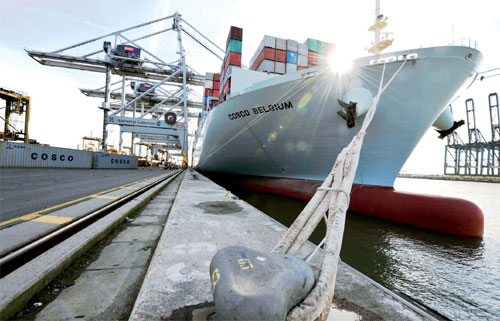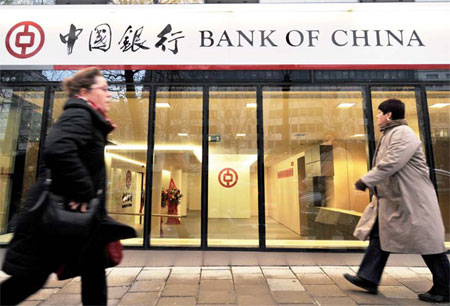The little big man of Europe
Updated: 2013-11-08 09:19
By Martin Banks (China Daily Europe)
|
|||||||||||

|
Top: A Cosco container ship arrives at the Belgian port of Antwerp in April. Above: Bank of China is the first Chinese bank to open a branch in Belgium. photos Provided to China Daily |
Chinese business takes a shine to the small but centrally important Belgium that punches above its weight in the continent
The contrast could not be more stark. One is a global economic superpower, the other a minnow by comparison.
The apparent gulf between China and Belgium is all too obvious, with the latter's 11 million population half that of Shanghai alone and its surface area roughly the size of Hainan island.
But in many other ways, Belgium is a big country - and one that is increasingly attracting serious Chinese investment.
To the disbelievers, the facts are clear enough: Belgium is a top-10 exporter and above all a top destination for foreign investment.
Figures show that Belgium ranks fifth in terms of inward FDI, behind the United States, United Kingdom, France and Hong Kong with an estimated 706 billion euros ($957 billion). A total of 169 foreign investment projects were launched in 2012, a 10.5 percent increase on 2011.
Many of these investors are Asian companies and, from China, Belgium has been able to attract the Cosco (the Chinese state shipping company), Huawei, Sany and Hainan Airlines.
How can Belgium, a nation once dismissed by leading UK politician Nigel Farage as a "non-country", make this happen?
A source at Flanders Investment and Trade says: "The answers obviously are many, but essentially they revolve around access; access to productivity, skills and R&D; access to the European number one for logistics; access to targeted tax incentives."
Brussels plays host to the European Union, NATO, more than 120 international governmental organizations and approximately 1,400 NGOs. With 159 embassies and 2,500 diplomats, Brussels ranks second in the world in terms of diplomatic representations.
Apart from logistics, Belgium is home to one of the densest clusters of life sciences and related research in Europe, while funding and venture capital is widely available.
The land of frites and chocolate also has expertise to offer elsewhere, such as in renewable energy, environment, IT, chemicals, agriculture and medical devices.
But, adds the FIT source, even more important is how central a role Belgium plays in Europe. "It is where decisions are made at EU level on trade, on standards and regulations in nearly all industrial sectors," the source says.
"These decisions affect every company which aims to do business in the EU. Whoever aims to understand and influence these decisions needs to be in Belgium.
"What is less easy to capture in stats and figures is another reason why so many Chinese people appreciate us - the ability to enjoy what is good about life: good food, stylishness and high living standards."
Starting off in February 2007 with just five employees, Huawei's activities in Belgium have grown exponentially, and today total around 140. The telecommunications giant says Belgium is now a "key part" of its European investment strategy.
"Investments between Belgium and China are complementary and of strategic importance for both sides," says Hudson Liu, country manager of Huawei Belgium.
"Belgium is a strategic location for us for a number of reasons: our activities here include a business center, an EU affairs office and an R&D site with facilities in three Belgian cities - Leuven, Louvain-la-Neuve and Gent.
"In the framework of our local business operations we have created close relationships with key telecom operators and business channel partners.
"But we are not only here to do business. Belgium is home to the headquarters of the EU institutions, and we have created our public affairs office in Brussels to maintain a two-way dialogue with EU stakeholders.
"Belgium has also key competence to offer in the field of photonics and chipset research. We have therefore decided to re-invest profits here to draw on local expertise, namely by acquiring Belgian R&D startups such as M4S and Caliopa. By making them a part of our Belgian R&D site, we are enhancing our global capabilities and competitiveness."
Further evidence of growing Chinese interest came last year when 100 Chinese companies, including a soft drinks manufacturer, an electronics company, a bank and a restaurant chain, chose Belgium as the location for their European plants.
The investors say that in time 5,000 jobs could be created, and that they chose Belgium because of its strategic location, cheap real estate prices and an advantageous tax regime.
Elsewhere, ICBC, one of China's Big Four banks, which has a branch in Brussels, has made a major investment in the Antwerp diamond sector.
"For us, China is the market of the present and the future," says Ari Epstein, of the Antwerp World Diamond Centre. "It was actually the Chinese who took the initiative for the investment project. We are of course very happy with this."
Everyone is currently courting Chinese companies, and the flood of Chinese investment in Belgium is particularly welcome to a government intent on ramping up growth.
The Belgians, of course, are keen for this to be a two-way street. China, with its 1.3 billion population and relatively underdeveloped market offers huge opportunities for Belgian businesses to invest, and in September, several major deals were struck following a four-day trade mission to China led by Flemish Premier Kris Peeters.
Chinese interest in Europe is part of a shift in the "going-out" strategy.
"As this policy is put into practice by more and more Chinese companies, these firms may now also be looking at gaining a foothold in the European market or moving closer to existing European customers in order to better manage their market," says Bernard Dewitt, chairman of the Belgian-Chinese Chamber of Commerce.
"If that is the case, then it would be a mistake not to include Belgium in their range of options."
A source at AWEX, the Walloon foreign trade and investment agency, says that though China maintains a keen appetite for raw materials in places such as Africa, it will also want to use its large cash reserves to buy into developed nations, and sees Belgium as an ideal destination. The Chinese see Belgium as being on a growth path, and values the legal standards and openness of its economy.
China is Belgium's largest trading partner in Asia, with more than 1,500 companies exporting to China and 300 investors in China.
On the flip side, Belgian Prime Minister Elio Di Rupo underlines the "many benefits" available in Belgium to attract Chinese companies and investment, saying the country is a "great gateway" to the European market.
Today's Top News
Li: China-Europe 2020 plan 'unprecedented'
Blueprint tightens China-EU links
Obama sets new date for Asia visit
Manufacturing PMI may decrease
'Tapering' of QE by US would benefit world
China's stealth drone flies for test
Evidence gained by torture banned
Europe can be a mirror of future China
Hot Topics
Lunar probe , China growth forecasts, Emission rules get tougher, China seen through 'colored lens', International board,
Editor's Picks

|

|

|

|

|

|






